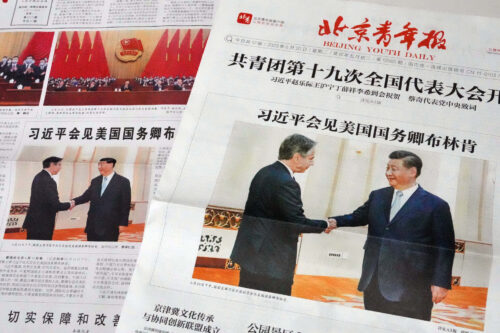U.S. red states threaten China divestment, but so far, they are just virtue signaling
As China’s post-pandemic economic recovery falters, several U.S. states are considering action to divest public funds from Chinese equities, often citing national security and ideological reasons. However, their concerns seem to stop when there is real money at stake.

In May 2023, Indiana Governor Eric Holcomb signed into law a ban on state pension investments in equities controlled by the People’s Republic of China and the Chinese Communist Party (CCP), a ban that sets a five-year deadline for divestment from Asia’s superpower.
Indiana is not the only U.S. state making noise about wanting to get its public money out of Chinese firms on the grounds that the country’s leadership poses a threat to U.S. national security and violates its own citizens’ human rights. Other U.S. states, all of them with recent Republican voting records, have followed in Indiana’s footsteps.
The moves come in the run-up to a U.S. election year as the administration of President Joseph Biden, a Democrat, strives to repair strained ties with Beijing.
In May, the Republican governors of Texas, Iowa, South Dakota, and Mississippi sent a joint letter to the CEO of U.S. investment management giant Vanguard, asking that it follow through on its January 2023 plan to explore setting up an emerging markets fund that excludes “any investments in China.”
Christopher Garten, one of the Indiana state senators who authored the legislation severing ties between the Indiana Public Retirement System (INPRS) and China, said in a statement in May, “Our state acknowledges that any investment in China is an issue of national security and a monetary endorsement of human rights violations.”
The joint letter to Vanguard from the red-state governors cited as their reason for asking that their state pension money be pulled out of China a belief that the “CCP is ramping up efforts to infiltrate the United States” by purchasing farmland to control food supplies, collecting data via the popular social media app TikTok, and gathering intelligence via a surveillance balloon that flew over the U.S. in February.
“We strongly encourage Vanguard to begin offering a new product isolated from risk posed by the CCP as soon as possible so states have an option to protect our citizens from exposure to the CCP without jeopardizing our financial returns,” wrote the governors Kristi Noam of South Dakota, Kim Reynolds of Iowa, Tate Reeves of Mississippi, and Greg Abbott of Texas.
China news, weekly.
Sign up for The China Project’s weekly newsletter, our free roundup of the most important China stories.
Empty threats?
But observers of Indiana’s moves against China said that what might seem a bold statement in the run-up to the U.S. election season is actually a piece of legislation riddled with loopholes.
“I think what Indiana passed is, in a way, a very controlled ban,” Fei-Hsien Wang, an Indiana University professor of Chinese history, told The China Project. “It only banned the pension fund investing in companies linked with the Chinese Communist Party.”
One could argue that every business venture in China is beholden to, if not directly connected to, the Party — by dint of the fact that the CCP is the unchallenged authority governing the economy. Specifically, the law says investment is restricted for companies where the Chinese government is involved in the governance structure, monitoring, or internal human resources decisions. This would certainly include any state-owned enterprises, but other companies could still be fair game for Indiana pension money.
“There is flexibility and wiggle room for the Indiana State, and the pension fund,” Wang said.
According to its 2022 annual report, the Indiana state pension was valued at $42.4 billion. A note explaining the impact of the law showed that the pension had $1.1 billion invested in Chinese stocks, and now must pull $750 million of those investments, including $400 million in stocks and bonds, and $350 million in commingled funds.
However, the Indiana legislation also contains exemptions. If the cost of divesting from a commingled fund managed by a firm such as Vanguard is greater than 10% of the value of the restricted Chinese equities in that fund, then the state pension is free to continue to invest.
In other words, if a divestment under the Indiana law threatens to shrink state pensioners’ retirement gains, the stated goal of the law — to punish Chinese firms tied to the CCP — is undermined for the sake of profit. The exemption echoes the wishes of the Republican governors who wrote to Vanguard, asking that the firm divest from China only if such divestment did not jeopardize their financial returns.
The legislation also allows the board to defer divestment from traded Chinese companies if they abide by transparent financial record-keeping standards set out by the Sarbanes-Oxley Act of 2002. Thus, U.S.-listed Chinese stocks such as the ecommerce giants Alibaba and PDD Holdings, and automakers XPeng and NIO, among dozens of others, are exempt from the Indiana pension investment ban.
Florida’s pension, one of the largest in the country at just over $241 billion in April 2022, had about 2.8% of its funds invested in China until the Florida State Board of Administration (FSBA) announced that month that it would pause new investment strategies in China. As of February 2023, the Florida state pension had about $235 billion, down 2.5% from the time of the investment halt.
The Tennessee exception
Some state funds that chose to avoid investing in China in the first place have benefited from their decision. The Tennessee State Consolidated Retirement System (TCRS) folded emerging market funds into its portfolio in 2012, but opted to exclude some countries, including China.
“There was an underlying risk that was being underappreciated, which is the risk of investing in countries like China and Russia that are autocratic and non-democratic, and also corrupt,” Michael Brakebill, the TCRS chief investment officer since 2008, told The China Project.
Tennessee’s choice to avoid China investments has paid off in recent years, with the state’s emerging market portfolio outperforming many of its peers as China’s economy struggled through the coronavirus pandemic, tensions with the U.S., and national policies that prioritize national security over growth.
Over the past five years, the Tennessee pension’s emerging markets portfolio has seen an annualized return of 10.2%, compared with an emerging market index that gained 9.2% a year over the same period, according to financial information firm MSCI.
Federal divestment
Beyond state pensions divesting from China, some national retirement funds may be barred from investment in China, too, if some members of Congress succeed in pushing through a proposed act.
The Taxpayers and Savers Protection Act, or TSP, would prevent the national Thrift Savings Plan fund from investing in many Chinese securities. The Thrift Savings Plan is a national retirement savings plan for federal employees and uniformed service members, which, at the end of 2021, had over $800 billion in assets under management.
Upon introducing the bill, senators from both major U.S. political parties made statements demonstrating they believe the U.S. should avoid investments in China for geopolitical and ideological reasons.
“It’s dangerous to prop up companies that threaten the interests of the U.S. and our allies, and it would be particularly egregious to do so with the hard-earned savings of federal workers, including our military and civilian workforce,” said Senator Jeanne Shaheen (D-NH).
Senator Joni Ernst (R-IA) was more direct: “I won’t sit idly by as U.S. dollars bolster communists and dictators,” she said.
The proposed legislation followed a June 2022 program by the Thrift Savings Plan’s managers — the Federal Retirement Thrift Investment Board — that allowed retirees to invest in any of 5,000 mutual funds managed by the likes of Vanguard, BlackRock, Fidelity, and T. Rowe Price. Many of the funds include substantial investments in Chinese companies.
Some of the mutual funds include investments in companies that are barred by the U.S. government from purchasing U.S. goods and services on the grounds that they pose national security threats.
For example, as of October 2022, one Vanguard fund focused on emerging markets held more than 1.3 million shares of iFlyTek, a Chinese voice recognition software company that has been on a U.S. export control list since 2019 for supplying police in China’s Xinjiang Uyghur Autonomous Region, where artificial intelligence technology is a key part of a highly invasive surveillance regime and where some 1 million Uyghur Muslims have been detained in state-run camps since 2016.
Americans with U.S. pensions should be able to choose whether their dollars go to support problematic Chinese companies, said Isaac Stone Fish, whose firm, Strategy Risks, helps companies navigate China-related problems.
“Ordinary investors worried about climate change, or the U.S. military industrial complex, can invest according to their ethics,” Stone Fish told The China Project. “As pension funds grow increasingly aware of their exposure to China, ordinary investors who don’t support the genocide in Xinjiang should be able to invest ethically as well.”
Waning interest in China
Measures to limit U.S. pension funds from investing in China come as other major institutional investors are showing concern over the growing risks of putting money in Asia’s largest economy.
Chinese private equity and venture capital firms have seen a dramatic reduction in interest from major U.S. investors such as university endowments and foundations. Investors also are pulling back from the large Chinese tech companies Tencent and Alibaba, among others, partly because Beijing’s strict controls make it increasingly difficult to obtain clear and unbiased business information.
Chinese authorities recently raided the Mintz Group, Bain & Company, and Capvision consultancies that help overseas investors get accurate China business information. Authorities also have restricted overseas access to tools like Wind Information, one of the country’s top financial data aggregation tools.
Investors also have been spooked by Beijing’s growing willingness to crack down on entire sectors of the economy. In July 2021, authorities announced a sweeping crackdown on the private education sector, erasing billions of dollars in the market value of online education firms.
“The most important factor causing investment funds to pull back from China is the strong leftward turn of the economy under Chairman Xí Jìnpíng 习近平, the growing threats of nationalization of assets, and the Chinese Communist Party’s willingness to harass and arrest businesspeople in sensitive areas of the economy,” said Stone Fish. “Geopolitical tensions are a distant second to Beijing’s growing command over China’s economy.”
Companies
iFlyTek 科大讯飞
Additional sources and data
Xi met with Blinken, Li courts German businesses, Modi to visit the U.S. / The China Project
A closer look at ‘balloon-gate’ / The China Project
TCRS’ Aversion to China Aids Emerging Markets Portfolio / Markets Group
U.S. Investors Are Bailing Out of China Funds / The Information
Chinese tech groups suffer as foreign investors take flight / Financial Times
Chinese data provider tightens some information access for offshore users / Reuters
U.S., European Investment Banks May Have Lost Some $12 Billion As Chinese Education Firms Crashed / Forbes






